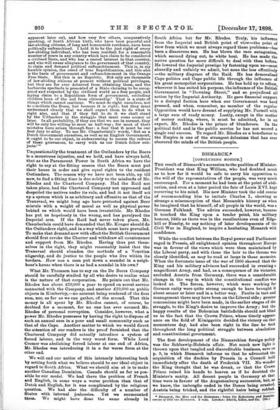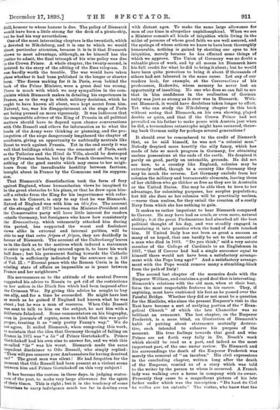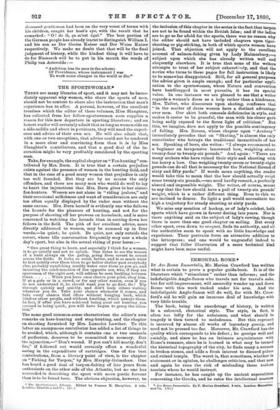BISMARCK.*
[CONCLUDING NOTICE.]
THE result of Bismarck's accession to the position of Minister. President was that King William, who had doubted much as to how far it would be safe to carry his opposition to the will of the representatives of the people, was very much encouraged. For a moment he had been at the point of abdi- cation, and even at a later period the fate of Louis XVI. kept recurring to hie mind. His new Minister took the odd course of recommending him to imitate Charles I., showing as strange a misconception of that Monarch's history as when he imagined that he himself, of all people in the world, was a German Falkland. The advice succeeded, however, because it touched the King upon a tender point, his military honour, little as there was in the recollections even of Edge- hill or Naseby, to say nothing of later developments of the Civil War in England, to inspire a hesitating Monarch with confidence.
While the conflict between the Royal power and Parliament raged in Prussia, all enlightened opinion throughout Europe was in favour of the views which were then maintained by the Liberal party, and with these the heir to the throne was closely identified, as may be read at large in these memoirs. When the fortunate issue of the war of 1866 showed that the King and his military advisers had succeeded in creating a magnificent Army, and had, as a consequence of its victories, excluded Austria from Germany, there was a considerable change in the way in which the constitutional conflict was looked at. The forces, however, which were working for German unity were quite strong enough to have brought it about sooner or later and in a better way. Faults in tact and management there may have been on the Liberal side ; greater concessions might have been made, in the earlier stages of the struggle, to the King's desire to improve the Army ; but the happy results of the Bohemian battlefields should not blind us to the fact that the Crown Prince, whose timely appear. ance on the field of Koniggrhtz decided the victory on that momentous day, had also been right in the line he took throughout the long political straggle between absolutism and constitutional government.
The first development of the Bismarekian foreign policy was the Schleswig-Holstein affair. Not much new light is thrown upon that tangled and discreditable business, save on p. 9, in which Bismarck informs us that he advocated the acquisition of the duchies by Prussia in a Council held immediately after the death of Frederick VII. No wonder the King thought that he was drank, or that the Crown Prince raised his hands to heaven as if he doubted the Minister's sanity. All decent people in Germany at that time were in favour of the Augnstenburg succession, but, as we know, the imbroglio ended in the Danes being crushed, Austria being tricked, and the rightful heirs being robbed.
• Bismarck, the Man and the Statesman: being the Reflections and Remiss' mesa of Otto von Bismarck. 2 vols. London: Smith, 'hider, and Co. 13&•1 Still, honour to whom honour is due. The policy of Bismarck would have been a little strong for the deck of a pirate-ship, bat he had his way nevertheless.
One of the most interesting chapters is the twentieth, which is devoted to Nikolsburg, and it is one to which we would direct particular attention, because it is in it that Bismarck ebows to most advantage, although, as he himself has the justice to admit, the final triumph of his wise policy was due to the Crown Prince. A whole chapter, the twenty-second, is devoted to the story of the editing of the Ems telegram. It was .hardly worth the trouble. The war would have taken place whether it had been published in the longer or shorter form. The forces making for it in Paris, even behind the back of the Prime Minister, were a great deal too strong. There is much with which we may sympathise in the com- plaints which Bismarck makes in detailing his experiences in France, as to the way in which military decisions, which he ought to have known all about, were kept secret from him. Natural, too, was his disappointment at the siege of Paris not being pressed on more vigorously. It was ludicrous that the responsible adviser of the King of Prussia in all political matters should have to depend upon chance conversations with Odo Russell and others for information as to what the beads of the Army were thinking or planning, and the pro- longation of the siege dangerously lengthened the chapter of accidents, giving an opportunity to unfriendly neutrals like Beust to work against Prussia. Yet in the end surely it was well that buildings which were the ornament of Paris, such as the Tuileries and the Hotel de Ville, should be destroyed not by Prussian bombs, but by the French themselves, to say nothing of the good results which may ensue to her neigh- bours from the ineradicable hostility between factions, brought about in France by the Commune and its suppres- sion.
That Bismarck's dissatisfaction took the form of fury against England, whose humanitarian views he imagined to be the great obstacles to his plans, or that he drew upon him- self a rebuke from the King for his impertinence with refer- ence to his Consort, is only to say that he was Bismarck. Hatred of England was with him an idc'T fire. The account of the struggle of 1873 between the Minister-President and the Conservative party will have little interest for readers outside Germany, but foreigners who know how consistently the Kreuzzeitung, which vehemently attacked him during this period, has supported the worst and foolishest views alike in external and internal politics, will be able to say that entre fripon et fripon, they are decidedly in favour of Bismarck. The account of the Culturkantpf leaves na in the dark as to the motives which induced a statesman to enter upon it, or having entered upon it, to leave his work ball done ; but his permanent feeling towards the Catholic Church is sufficiently indicated by the sentence on p. 148 of Vol. IL : "Eternal peace with the Roman Curia is in the existing state of affairs as impossible as is peace between France and her neighbours."
His nervousness as to the attitude of the neutral Powers suggested his advice to Russia to get rid of the restrictions on her action in the Black Sea which had been imposed after the Crimean War. By giving this advice he sought to buy one ally, and for a time he succeeded. He might have lost as much as he gained if England had known what he was about ; but he was a man of resource. When Odo Russell was sent to talk to him on the subject, he met him with a deliberate falsehood. Some commentators on his biography, even in journals of repute, seem to think that this was quite proper, treating it as " only pretty Fanny's way." We do not agree. It suited Bismarck, when composing this work, to maintain that the idea that Germany thought of falling on France in 1875 was "a lie" of Prince Gortchakoff's. Prince Gortchakoff had his own sins to answer for, and we wish this so-called "lie" was his worst. Bismarck made the same Impudent disclaimer to Odo Russell, who simply replied : "Then will you censure your Ambassadors for having deceived Us ? " The great man was silent ! He had forgotten for the moment that Odo Russell had been present at a violent scene between him and Prince Gortchakoff on this very subject !
It has become the custom in these days, in judging states- men of the past, to make very large allowance for the spirit of their times. This is right ; but it ie the tendency of some historians to carry indulgence much too far in dealing even with distant ages. To make the same large allowance for men of our time is altogether unphilosophioal. When we see a Minister commit all kinds of iniquities while living in the midst of persons of whose good faith we are well assured, and the springs of whose actions we know to have been thoroughly honourable, nothing is gained by shutting our eyes to his iniquities, merely because he has effected some things of which we approve. The Union of Germany was no doubt a valuable piece of work, and by all means let Bismarck have his full credit for what he did to bring it about; but he would have been quite powerless to bring it about if thousands of others had not laboured in the same cause. Let any of our readers look, for example, at the Conversations of his predecessor, Radowitz, whose memory he never lost an opportunity of insulting. No one who does so can fail to see that in him oonfidence in the realisation of German unity was just as strong as it ever was in Bismarck. With- out Bismarck, it would have doubtless taken longer to effect. Yet who can study the Nikolsburg chapter in this book without seeing that Bismarck, on his own showing, played double or quits, and that if the Crown Prince had not prevailed on his father to make peace with Austria just when he did, a tremendous catastrophe might have occurred, throw- ing back German unity for perhaps several generations ?
It should ever be remembered to the credit of Bismarck that, as he said himself, he was not "a colonial man." Nobody despised more heartily the silly fancy, which has made of late so much progress in Germany, for obtaining useless possessions at the ends of the earth. He despised it partly on good, partly on untenable, grounds. He did not see bow, to a country like England, colonies may be extremely useful, though to a country like Germany they may be much the reverse. Let Germany exclude from her colonies the military and bureaucratic elements, leaving those of her children who go thither as free as they are in Australia or the United States. She may be able then to turn to her advantage, for colonising purposes, her surplus population; but till she does so her colonies will be practically useless, —worse than useless, for they entail the creation of a costly Navy from which she has nothing to gain.
It makes us rather impatient to hear Bismarck compared to Cavour. He may have had as much, or even more, natural ability; bat the great Piedmontese had absorbed all the best political thought of his day, and was steadily engaged in translating it into practice when the hand of death touched him. If United Italy has not been as great a success as many of us hoped, that can hardly be set to the account of a man who died in 1861. "Do you think," said a very astute member of the College of Cardinals to an Englishman in 1887, " that if Cavour had had a single successor equal to himself there would not have been a satisfactory arrange- ment with the Pope long ago?" And a satisfactory arrange- ment with the Pope would remove many a stumbling-block from the path of Italy !
The second last chapter of the memoirs deals with the Emperor William, and contains a good deal that is interesting. Bismarck's relations with the old man, when at their best, form the most respectable features in his career. They, if anything, must have cushioned his feet as he passed over the Fateful Bridge. Whether they did or not most be a question for the Moollahs, who since the present Emperor's visit to the East have become a sort of outlying portion of the " Evan- gelical Church " of which the late Chancellor was so brilliant an ornament. The last chapter, on the Emperor Frederick, is a mere blind, an illustration of Bismarck's habit of putting about statements mutually destruc- tive, each intended to subserve his purpose of the moment. His true feelings towards that good and wise Prince are set forth very fully in Dr. Busch's work which should be read as a part, and indeed as the most important part, of the one under review. To Bismarck and his surroundings the death of the Emperor Frederick was merely the removal of "an incubus." His civil expressions in the concluding chapter, written long after the death of the Emperor, remind us of a story which was told to the writer by the person to whom it occurred. A French lady was walking over a house in company with its owner. Presently they came to a magnificent picture of his late father under which was the inscription: "Du haut du Ciel to veilles sur tee enfants." The visitor, who knew that the deceased gentleman had been on the very worst of terms with his children, caught her host's eye, with the result that he remarked : " 0 ! de lb., ea m'est egaL" The best portion of the German people has already learnt to distinguish William I. and his son as Der Greise Kaiser and Der Weise Kaiser
respectively. We make no doubt that that will be the final judgment of history, while the kindest thing it will have to do for Bismarck will be to put in his mouth the words of Philip van Artevelde
" Ambition has its uses in the scheme Of Providence, whose instrument I was
To work some changes in the world or die."












































 Previous page
Previous page